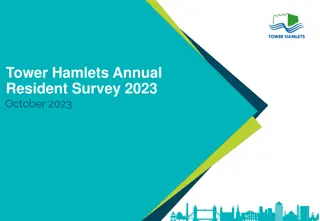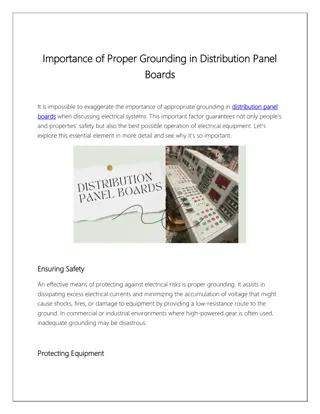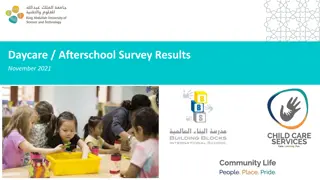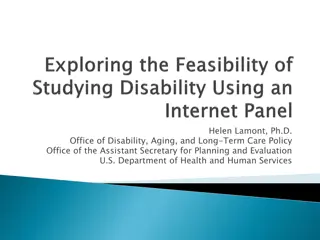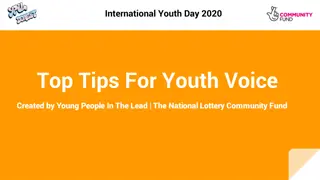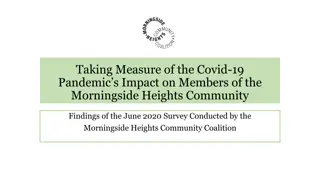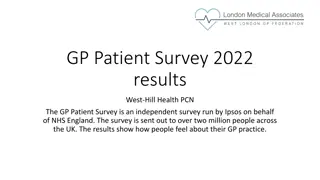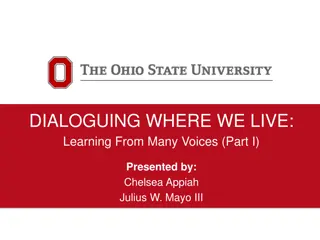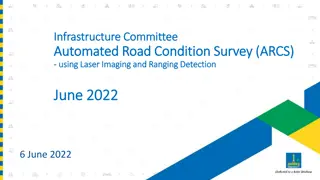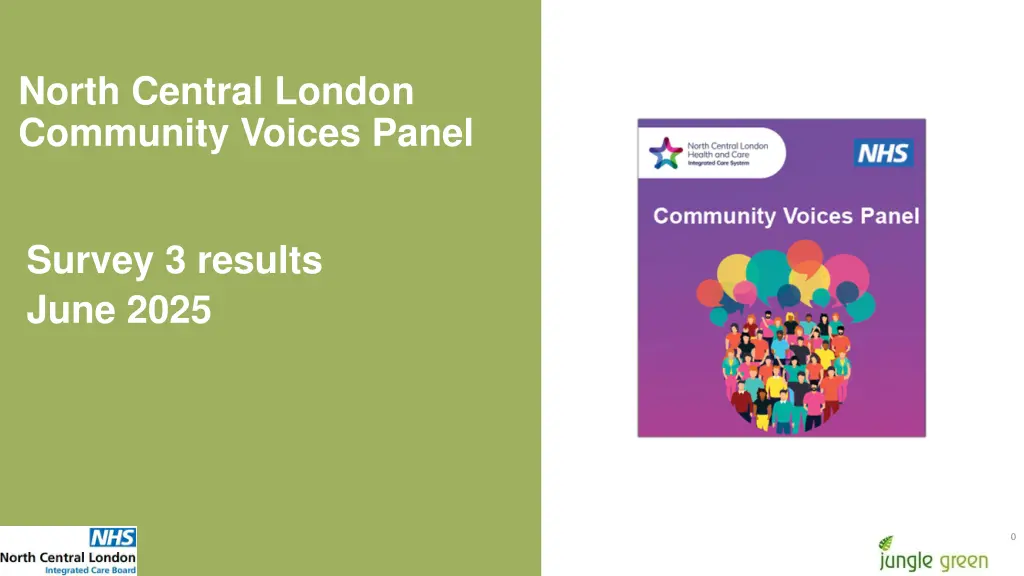
Insight into North Central London Community Voices Panel Survey Results
"Explore the outcomes of the North Central London Community Voices Panel survey, offering in-depth analysis on health information sources, self-care initiatives, and community feedback. Gain valuable insights from a diverse sample of NCL residents. Discover trends in respondents' demographics and preferences, highlighting the importance of engaging with the local population for effective healthcare strategies."
Download Presentation

Please find below an Image/Link to download the presentation.
The content on the website is provided AS IS for your information and personal use only. It may not be sold, licensed, or shared on other websites without obtaining consent from the author. If you encounter any issues during the download, it is possible that the publisher has removed the file from their server.
You are allowed to download the files provided on this website for personal or commercial use, subject to the condition that they are used lawfully. All files are the property of their respective owners.
The content on the website is provided AS IS for your information and personal use only. It may not be sold, licensed, or shared on other websites without obtaining consent from the author.
E N D
Presentation Transcript
North Central London Community Voices Panel Survey 3 results June 2025 0
Report structure 1. Introduction Page 2 2. Overview summary Page 5 3. Survey 3 results: 3.2 Bringing Care Closer to Home (Pharmacists, NCL Self-Care Medicines Scheme, Hospital at Home and Closer to Home services) 3.3 WorkWell 3.1Sources Used for Health Information Page 13 Page 22 Page 30 4. Appendices Survey 3 sample profile Page 40 1
Section 1: Introduction 2
Section 1 - Introduction Mission of the North Central London Community Voices Panel The Community Voices panel provides the Integrated Care Board (ICB) in north central London with an additional systematic approach to gathering insight and feedback on a range of health and care issues from a representative sample of the resident population. The panel will be used to complement and expand the ICB s existing methods of engagement and involvement to support their continued efforts to hear from a representative mix of the local population in Barnet, Camden, Enfield, Haringey, and Islington. Survey 3 was completed online by Community Voices panellists from end April to early June 2025 and included questions on the following: Health information sources, Self Care Medicines Scheme, Hospital at Home, Bringing Care Closer to Home and WorkWell 3
Section 1 Introduction A total of 192 responses to survey 3 were received, with the sample weighted to reflect the NCL population (19% response rate) % of NCL entire population/survey 3 participant rim weighted profile (192) % of survey 3 participants unweighted (192) N.B. 48% Male (inc transgender men) Survey 3 participants responses have been rim weighted to reflect the profile of the NCL population (according to 2021 census data). 29% 52% Female (including transgender women) 69% 1% Prefer to self describe 1% 1% We can see that females, older age groups and white panellists are more likely to respond to surveys (looking at the pink bars) than their counterparts. The sample has been rim weighted (green bars) to adjust for this. Prefer not to say 2% 15% 16-24 years 5% 22% 25-34 10% 19% 35-44 15% 16% Rim weighting means that a combination of reweights are applied to the sample, in this case: gender, age and ethnicity. 45-54 13% 13% 55-64 22% 15% 65+ 34% 1% Prefer not to say 1% 56% White 68% 42% Ethnic groups other than white 31% 2% Prefer not to say 1% 4
Section 2: Overview summary 5
Section 2 Overview summary Health Information Sources A mobile phone is the most used device by the majority (84%) to access health information. More in Islington, 25- 34 years, ethnic groups and those with dependent children 19% of the sample of NCL residents use Social Media (more by ethnic groups other than white and those with dependent children) despite it being the least trusted source (only 1 in 10 say most trusted) 1 in 2 use a computer (more in Islington, Barnet, Males and 65+ years) Other online services used by and also trusted by just under one quarter of the sample of NCL residents (notably more females, white ethnic backgrounds and those with no dependent children) include a huge range of different resources Health Care Professionals are the main source used usually by three-quarters of our sample of NCL residents to get health information 1 in 4 use a tablet (fewer in Islington and fewer 25-30 years) Many find the online content types suggested preferrable or acceptable buta fair proportion are not keen on them Only 2% not accessing Health Info online currently Nearly 9 in 10 view HCPs as the most trusted resource, significantly more trustworthy than other sources For example, one half of our sample find Social Media and interactive tools & quizzes acceptable whilst the other half are not keen The local pharmacy is identified as the main community source from which the majority (80%) would like to get more information about health and care services Content that signposts to NHS services is the most preferred online content (by just under one half) and is the least polarising Online NHS Services (NHS.uk and the NHS app) are next most used and trusted ( by over half of our sample) confirming the importance of both NHS and NCL in health and wellbeing info provision This illustrates the need for health info to be delivered via multiple channels and in a range of ways Graphics, charts or visual content and written articles / blog posts are the next most preferred (by 1 in 3) and next least divisive This is also reinforced by high levels of regular use of a range of digital channels (notably email, messaging apps, social media and websites) for other purposes One-third would like to access this information via a local library or Community Centre Opportunity to leverage GP and Hospital websites more 3rd most trusted resource but only used by 1 in 10 currently All other content types seem to polarise opinions to varying degrees Only 4% not using any digital channels 6
Section 2 Overview summary Bringing Care Closer to Home - Pharmacists High levels of trust in pharmacists when prescribing a repeat medication (95% very / quite confident) or prescribing a medicine used previously (92%) highlighted by this sample of NCL residents However, there is a clear need to persuade more residents to allow a pharmacist to prescribe a new medicine (37% not very confident yet) this cuts across all demographic groups 7
Section 2 Overview summary NCL Self-Care Medicines Scheme (SCMS) Very low awareness of NCL SCMS in this sample of NCL residents, less than 1 in 10 aware 9 in 10 say they are unaware or not sure of NCL SCMS, applies to all resident types and demographics Positively, however, nearly three-quarters claim they would use / recommend NCL SCMS - Less than 1 in 10 would not - One-fifth unsure / don t know (notably in Camden and among females) Main barriers to use / recommendation include: - A general lack of awareness (over 50%) - Not having enough information yet (nearly one-fifth) - A perception of ineligibility (1 in 10) 8
Section 2 Overview summary Hospital at Home Only 12 panellists claim to have had any experience (either personally or via a 3rd party) of Hospital at Home but they report generally positive / good feedback Only one reported a mixed experience due to an unattended home visit 60% of this sample of NCL residents feel very / quite confident to use Hospital at Home: Only 9% not very confident (more likely in Haringey and among those with Carers) Lack of confidence put down to concerns around safety, the risks associated with early discharge, a lack of trust in the quality of care and cost-cutting perceptions The main suggested NHS Services they would like to see provided Closer to Home include: Mental Health Services (60%) General Health Advice and Diagnostic Tests (over 50%) Urgent Care (49%) 9
Section 2 Overview summary WorkWell (1) Under one-quarter of this sample of NCL residents identify having an enjoyable job as something that matters the most to them. Not picked at all by those who are unemployed (not seeking work) and only by one who is unemployed (seeking work) indicating it may not yet be an aspiration to many A wide range of considerations are seen to be important when looking for / changing jobs Around 4 in 5 claim having an enjoyable / interesting job, an understanding manager, a salary that means I m better off working, the ability to learn and try new things and an easily accessible job are most important Things that matter more include their physical health (75%), their accommodation / home (71%) and their partner / family (63%) Personal circumstances and subjectivity clearly impact on which considerations are deemed to be important eg a job fitting health conditions / disability, having worked in a previous job or having a family polarise views Around 50% also feel their mental health and feeling safe are important matters In terms of employment status the profile of this sample is made up mostly of: One-quarter employed full-time Nearly one-quarter retired 17% unemployed 10% full time students 10
Section 2 Overview summary WorkWell (2) Two-thirds usually turn to the internet for assistance when seeking support with finding / changing jobs A wide range of job support types will need to be provided to cater for the differing needs of this sample of NCL residents Around half turn to friends and family The polarising nature of each prompted support type highlights the lack of an easy solution and the differing needs and circumstances that exist in this sample Over one-third use their own personal networks One-quarter use a Jobcentre Support Programme All support types are seen as Extremely / Quite Important by at least half up to three- quarters of respondents One-fifth turn to social media Less than 1 in 10 would usually use their GP practice or a hospital appointment for support currently 11
Section 2 Overview summary WorkWell (3) A lack of confidence in their ability is the main difficulty cited (40%) preventing this sample of NCL residents looking for / changing jobs One-fifth claim having a mental or physical condition / disability preventing work makes it most difficult to look for / change jobs. This reinforces the need for WorkWell in the NCL area One-fifth also point to uncertainty over job enjoyment, lacking skills or qualifications and not enough jobs out there they can do as the other difficult issues they face and thus barriers to seeking / changing jobs 12
Section 3: Survey 3 results 3.1 Sources used for Health Information 13
Section 3 Survey 3 results Health Info Sources Healthcare professionals are the main source used and significantly the most trusted source for Health Information for the majority of our sample of NCL residents. 33% cited over 4 different sources usually used (23% a single source, average 2.8) NHS Website and NHS App are the next most important sources and are equally the next most trusted sources (by over half) 1 in 5 using social media, despite it being the least trusted source. Use of GP and hospital websites doesn t match their perceived status as 3rd most trusted source % usual source / % trusted source 86% Lowest use Enfield 61% Males 84%, Females 67% 75% Healthcare professionals (such as your GP, nurse or pharmacist) 58% 46% Online via the NHS.uk website Under 34 years (49%) and those with conditions / disabilities (53%) using App more. Highest use in Camden 83% 57% 39% Online via the NHS app 29% Highest use in Camden 73%, Lowest Enfield 9% 35% Friends/ family/ carers 22% Females (29%), White ethnic groups (30%) and Those with no dependent children (27%( more likely to use other online sources. Lowest use in Enfield 12% 23% 10% Other online health sources Ethnic groups other than whites (26%) and those with dependent children more likely to use social media (50%) 19% Social media 25% 18% 32% Printed information (books, magazines or newspapers) Highest use in Barnet 22% 12% GP or hospital websites 21% 8% Charity or voluntary sector organisations 13% 2% Council or gov.uk websites Single mentions of: retired doctor so myself, listen to my own body, limited access - miss paper information, colleagues who are HCPs 1% N/A None Q: Where do you usually get health information from? Q: And which would you trust as sources? Base: n=192, total sample 14
Section 3 Survey 3 results Health Info Sources Examples given Information sources (1% mentions) Online sources: GP or Hospital websites / Charities Council / Gov.uk websites NHS Camden Islington Mayo Clinic 3% Google 2% Cleveland Clinic 2% PubMed articles 2% WebMD 2% Condition specific e.g. Migraine Trust 2% Online Journal articles 2% YouTube Videos - for injury, rehab exercises Healthline Newspapers online Unspecified medical websites NLM Neutral sources John Hopkins Recognised research charities Health Insurance website Labtestonline UK Diabetes UK Patient Access Natural Health Super-smart.eu Podcasts Dermatology Association Trusted sources The Blood Pressure Association Victoria Health Doctor surgeries 2% NHS 2% Mayo Clinic Other Hospital (not main) MIND 2% Asthma UK Cancer Research Dementia UK Alzheimer's UK British Heart Foundation Pandas Foodbank Healthwatch Islington Mind Diabetes UK Age UK Barnet Age UK Barnet Depression Alliance Macmillan Nightingale Osteoporosis Society Crohn's Colitis Can't remember Q: Where do you usually get health information from? 15
Section 3 Survey 3 results Health Info Sources Examples given Trusted Information sources (1% mentions) Online sources: GP or Hospital websites / Charities Council / Gov.uk websites UCL 4% GP surgery, practice 4% Royal Free London 2% NHS Various NHS hospitals across country Mayo Clinic American Hospitals Nation Hospitals Islington 2% Gov.uk Camden Barnet Mayo Clinic 5% Healthline 3% Migraine Trust 2% Online Journals 2% PubMed 2% Opinions online, don't assume factual - do refer to exercises, stretches Google Holland and Barrett YouTube - medical lectures Diabetes UK NLM Neutral - make decision not based on fear Cancer Research BBC, similar news website NHS pages NIHBR specialist Victoria Healthwatch Mind 4% British Heart Foundation 3% Mental health support is needed outside VCS org s Cancer charities Age UK Asthma UK MacMillian Alzheimer's UK Eric Community Centre Diabetes UK Heart Nightingale Osteoporosis Society Q: And which would you trust as sources? 16
Section 3 Survey 3 results Health Info Sources NHS signposting a key online content type much preferred by nearly half of our sample of NCL residents when seeking health info. Graphics / visual info and written articles / blogs next most preferred (by 1 in 3) A wide range of content types are viewed as acceptable to respondents, but equally they can polarise opinion. Health information should, therefore, ideally be available via multiple channels Not keen Content ok Much Prefer 48% 7% (59%% of White ethnic groups, much prefer NHS signposts) Signposts to NHS services (16% of those in Enfield not keen ) 46% Graphics, charts or visual content (49% of Barnet, 50% of females and 45% White ethnic groups much prefer graphics / visual content (33% of those in Enfield and 37% Retired not keen ) 36% 14% 50% 36% 25% Written articles or blog posts 39% 25% 23% Videos and tutorials 52% (83% of those in Enfield not keen ) (43% of Islington, 52% of 25-34 years and 34% of ethnic groups other than white much prefer Podcasts / audio 22% 47% Podcasts and audio content 31% 17% 42% Print at home info 42% (69% of those in Enfield, 65% Male and 61% of 25-34 years not keen ) 13% (29% of Barnet, much prefer tools / quizzes 52% Interactive tools and quizzes 36% (27% of Camden, much prefer social media 52% (68% of those in Enfield, 81% of 65+years, 76% of Retired not keen ) 10% Social media 38% Other mentions includes: None don t find online easy, Google, online commercially biased, Diabetes UKL, Web MD 17 Q: When looking for health info online, what type of content do you prefer? Base: n=163
Section 3 Survey 3 results Health Info Sources Other mentions Type of content preferred (1% mentions) Other type of content preferred: Google Online articles appear authoritative but are commercially biased Diabetes UK WebMD Doctor recommendation Good Nutrition Keeping Active Webinars, online workshops Broadsheet newspapers Depends on accuracy Journal, academic review articles Q: When looking for health info online, what type of content do you prefer? 18
Section 3 Survey 3 results Health Info Sources High levels of regular use of Digital Channels for wider purposes (beyond Health Info). Very few not using any regularly (4%) Two-thirds regularly using email, messaging apps, social media and websites % used regularly 78% Email (e.g., Gmail, Outlook) Those from Islington generally are the heaviest users of digital channels and Enfield the lightest users on average (eg email 94% vs 52%). (Of notable use by Females 80% vs 63% Males, 79% those with no conditions. Lowest use amongst retired 48%) 72% Messaging apps (e.g., WhatsApp, Slack, Telegram) Social media (e.g., Facebook, Twitter, Instagram, You Tube, LinkedIn, X (formerly known as Twitter)) 69% (Low use by Retired 50%) Websites (e.g., NHS.uk, local news websites, national news websites, blogs, other) 65% (Low use by those with no dependent children 70%) 47% Streaming services (e.g., Netflix, Spotify) 20% Community forums (e.g., NextDoor or Reddit) 4% I do not use any of the above regularly 1% Other Includes: Google, Bluesky Q: Which if any digital channels do you use regularly (for any reason)? Base: n=177 19
Section 3 Survey 3 results Health Info Sources A mobile phone is the dominant device type used to access online Health Info by the majority of NCL residents in this sample (over 4 in 5) 1 in 2 using a computer and 1 in 4 a tablet (generally the older, more in Enfield and those with carers) most 84% Use a phone the most to access online health info Only 2% not currently accessing health info online 53% computer 25% tablet More in Islington 96% Less in Enfield 70% More 25-34 years 97% Less 48% 65+years More 93% Ethnic groups other than white More 94% With dependent children More in Islington 73% Less in Barnet 38% More Males 64% Less Females 41% Less in Islington 15% More in Enfield 40% More 65+years 48% Less 25-34 years 34% More with Carer 74% Q: What devices do you use most to access online health info? Base: n=177 20
Section 3 Survey 3 results Health Info Sources The majority (80%) would like to get more health and care info from their local pharmacy followed by approximately one-third from a local library or via a community centre % wanting more health & care info from this source 80% Local pharmacy (24% of Enfield, 53% of Islington and 45% Ethnic groups want more from a local library) 36% Local library 27% Community Centre (7% of Enfield, 44% of Camden want more from a community centre) (5% of Enfield, 40% of Camden want more from a supermarket) 18% Supermarket 14% Local shops (21% of Females, 3% of Males want more from a Leisure Centre) 11% Leisure Centre (27% of those with a Carer and 20% of those with dependent children want more from a Place of Worship 10% Places of worship 2% GP surgery, health centre, hospital 2% None 5% Other Includes: Schools, education institutions, regular newsletter from NCL, drop-in centres, local online websites (council), local Facebook community groups, radio, better comms from GP, online sources easier to access than GP, festivals / events 21 Q: Where in your community would you like to get more info about health and care services? Base: n=176
The NHS is working hard to make sure we can get the care we need when we need and close to home. The aim is to make it easier for people to get the help they need from a trusted healthcare professional. For example, pharmacists can carry out consultations and, in some cases, prescribe medicine Section 3: Survey 3 results We re also trying to make sure people have access to the medicine they need regardless of costs. The Self-Care Medicines Scheme is set up so that people on low incomes, who would struggle to afford basic medicines for minor conditions, can access these for free. 3.2 Bringing Care Closer to Home (Pharmacists, NCL Self-Care Medicines Scheme, Hospital at Home and Closer to Home) Hospital at home provides care and support to patients at home as an alternative to people staying in hospital. This support is provided wherever the patient calls home, including care homes. This is also known as a Virtual Ward . Clinical teams check in on patients every day and may use technology like mobile apps and wearable devices to monitor patients health as well as visiting them at home to give them treatment as and when needed. Hospital at home doesn t replace hospital care but can be an option for patients who need ongoing review but don t need to be in a hospital bed or might be more comfortable at home: Virtual wards in North Central London - North Central London Integrated Care System 22
Section 3 Survey 3 results Care Closer to Home Greater confidence needs to be built persuading this sample of NCL residents to allow a pharmacist to prescribe a new medicine(37% are not very confident yet and cuts across all demographics). Very high confidence with repeat prescriptions (95% very / quite) and a previous prescription (92%) Not very confident Quite Confident Very Confident (Those in Islington (31%) and Haringey (30% more likely to say they are very confident (0% Camden, 6% Barnet) Medicine haven't taken before 37% 44% 19% (Those with no conditions (79%) more likely to be very confident about a previous medicine prescribed) Medicine prescribed before 7% 26% 66% (Those in Islington (96%) more likely to be very confident about a repeat prescription than those in Enfield (63%) Currently prescribed medicine 4% 17% 78% Q How much confidence would you have in a pharmacist prescribing for you or someone you care for (including any children you may have) in each of the following scenarios? Base n = 164 23
Section 3 Survey 3 results Care Closer to Home Very low awareness of NCL Self-Care Medicines Schemes (SCMS) currently in this sample of NCL residents (less than 1 in 10) 9 in 10 are unaware or unsure and this applies across all resident types Yes Aware 5% Don t know/ Not sure 14% Not aware of SCMS 81% 24 Q: Do you know about the NCL Self-Care Medicines Scheme? Base: n=174
Section 3 Survey 3 results Care Closer to Home The majority (73%) of this sample of NCL residents, however, claim they would use / recommend the NCL Self-Care Medicine Scheme (SCMS) Less than 1 in 10 would not use / recommend, one-fifth are unsure / don t know Uncertainty over using / recommending among: Those in Camden, 47% are unsure Females 31% unsure Don t know/ Not sure 22% Yes would use / recommend SCMS 73% Higher likelihood of using / recommending among: No 5% Those in Haringey 85% are likely Those in Islington 83% are likely Males 82% 25 Q: Would you consider using the NCL Self-Care Medicines Scheme if eligible or recommend to family / friends? Base: n=174
Section 3 Survey 3 results Care Closer to Home The main reasons for not considering / recommending or being unsure about the SCMS, 14% of our sample, cite a lack of awareness (over half), not having enough information (nearly one- fifth) and a perception they are not eligible (1 in 10) Lack of awareness - don't know what it is, never heard of it, don't know 52% Insufficient information, understanding - don't know enough, need more info, depends on benefits 17% Ineligibility - don't think qualify, my age, pensioner, free medications 10% Confidence, complexity concerns - overwhelming, don't feel confident enough, not medically clever 5% Not relevant to current health needs - don't need still young, over 80 and don't need 7% Experience of healthcare barriers - it takes me hours to get through to doctor 6% Scepticism, concerns about devices or systems - not keen on devices, would have to look system operates, easy to obtain medicines 3% Q: Why do you say you would not consider using or recommending the Self-Care Medicine Scheme or are not sure? Base: those saying would not consider or are unsure at the previous question n = 41 26
Section 3 Survey 3 results Care Closer to Home 60% feel quite or very confident to to use Hospital at Home. Only 9% are not at all or not very confident to use it citing safety, early discharge, a lack of trust in the quality and perceived cost- cutting concerns. One-third are unsure reinforcing the need for more info / understanding Those in Haringey more likely to be not at all confident 30% and those with carers 18% Confidence to use Hospital at Home Not at all confident Not very Not sure / Don't know Quite Very confident 60% confident 5% 4% 20% 31% 40% Why not at all / not very confident in Hospital at Home? (*low base - 15) Number of mentions 6 (40%) Safety concerns - scheme is unsafe, risks early discharge, insufficient support 4 (27%) Lack of trust, confidence in care quality - won't match hospital or will vary 4 (27%) Cost-cutting, undervalued care - saving money, not proper care 2 (13%) Dislike of / resistance to remote, online care 1 (7%) Bad experience of early discharge - too early, affecting safety / wellbeing 1 (7%) Not suitable for older, vulnerable people (older / living alone) 1 (7%) Lack of understanding, information 1 (7%) Depends on medical condition Q How confident would you be to use hospital at home? This would mean you were able to leave hospital earlier to recover at home with a check in from a clinician and simple technology to monitor your condition. You would be able to contact a healthcare professional urgently if needed? Base n = 171 Q Why do you say that? Base = those who say they are not at all / not very confident? n= 15 (low base unweighted sample) 27
Section 3 Survey 3 results Care Closer to Home Only 13 (8%) claim to have been offered or know of someone who has been offered Hospital at Home. Of those 12 claim to have taken up the offer. Experience of Hospital at Home? (12) Positive - preferred being at home than hospital, comfortable with service (2) Very good (2) Better for people to be in hospital, as helps family & friends, those without family (1) Good (1) Mixed experience good when they turned up, once didn't turn up and it was poor (1) Heart monitoring worked well (1) Was OK (1) End of life, home hospice care (1) No answer (2) The 1 respondent who didn t take up the offer, provided no reason for not doing so unfortunately Q: Have you or someone you know ever been offered this hospital at home service? Q: Did you take up the offer? If yes, What was your experience of it? Base: n=170 28
Section 3 Survey 3 results Care Closer to Home Mental Health support (60%) is the most requested NHS service wanted Closer to Home by our sample of NCL residents One half also request General Health Advice, Diagnostic Tests and Urgent Care % choosing each service 60% Mental health (Notably rising to 94% in Camden) 55% Health advice 54% Diagnostic test (Notably rising to 65% of females) (Notably rising to 77% in Haringey, lowest in Islington 26%, no difference between those with dependent children vs those without) 49% Urgent Care 43% Social care (Notably rising to 73% in Camden) 38% Support with medicines Social prescribing (talking to a non-clinical person about well- being needs, which might include housing or benefits advice) 38% (Notably rising to 53% of Ethnic groups other than white) 1% Sexual health 1% Primary Care Access - easier access to GP, continuity Preventative, Community Health - chiropody, continence, health visitor 1% 3% Other Includes self referral routes, alternative therapies, acupuncture, osteopath, no comment Q: What services would you like to see the NHS provide closer to where you live? Base: n=169 29
Section 3: Survey 3 results NCL ICB is working with a number of partners to provide WorkWell a free service that helps people with health issues or disabilities who are looking to start a new job, need support to stay in their current role or plan to return to work after an absence. We are interested in your views on the relationship between work and health and wellbeing to help us to shape this programme of work and inform our broader local Work and Health strategy and action plan. 3.3 WorkWell 30
Section 3 Survey 3 results WorkWell The things that matter the most to respondents are their physical health, their accommodation / home and their partner / family Around one half also feel their mental health and feeling safe are important Only slightly less than one quarter mention having an enjoyable job - not mentioned at all by the Unemployed (not seeking work) % choosing as top 4 things that matter the most 75% (Less likely in Camden 41%) My physical health 71% (More likely to be Males 79%, Less likely in Haringey 54%) My accommodation/ my home 63% My partner/ family 56% My mental health 50% (Less likely in Islington 36%) Feeling safe 42% Ensuring I have enough money 36% My friends (More likely in Camden 72% and White ethnic groups 46% and those with conditions 47%) (No mention by Unemployed (not seeking work) and only mentioned by 1 Unemployed (seeking work) 24% Having an enjoyable job Receiving practical help when I need it 22% (More likely in Enfield 50%) 21% Enjoying leisure activities (More likely in Camden 39%) ,Females 28% and those with conditions 29% 5% Other Q: In everyday life, which things matter to you the most?? Base: n=169 31
Section 3 Survey 3 results WorkWell A small number of Other Mentions some clearly reacted and responded to the written description of WorkWell (provided before this question) rather than to the question itself I realise this isn't the question, but my opinion is that the NHS has enough to do without also trying to help people get into work. There are a number of similar schemes already running. I know that Haringey council has its own scheme for the same thing. I suspect Barnet and other councils also do. Perhaps helping people to access these existing schemes might be a better approach Making sure employers don t discriminate unnecessarily against those with a disability. Mine were appalling and were allowed to get away with it (fortunately I m strong and stubborn). A completely trustworthy and wise individual (as well as an enjoyable job). Aids & adaptations in my home. extra railing, lift. These are all important My faith. Q: In everyday life what matters to you the most? Other mentions 32
Section 3 Survey 3 results WorkWell Around 1 in 4 of this sample of NCL residents are employed full-time and a similar number retired. Under 1 in 5 are unemployed and a similar number are part-time workers 1 in 10 are students 27% (More likely Ethnics 40%, Less likely in Camden 7%) Employed full-time 23% Retired (More likely Whites 33%) 15% Employed part-time (More likely Females 25%) 10% Full-time student (More likely in Islington 26%) Unemployed but not looking for work 10% Unemployed and looking for work 7% (More likely those with Carers 30%) 4% Self-employed/ freelance 4% Other Includes: Born with disability, not applicable, working (unspecified), terminally ill, academic between contracts 33 Q: What is your current employment status? Base: n=169
Section 3 Survey 3 results WorkWell A wide range of considerations are important to this sample of NCL residents when looking for a job / looking to change jobs Approximately 4 in 5 view an enjoyable / interesting job, an understanding manager , a salary that makes it better off to work, the ability to learn and try new things and job that is relatively easy to get to as the most important considerations Views on important considerations are clearly subjective and can be influenced by personal circumstances Quite / Extremely Important % Not very important Not Sure Quite Important Extremely important to me (More important in Islington 74% Extremely, Less for White groups 13% Not Very) 58% 56% 53% 2% 32% 90% Enjoyable/ interesting job 8% (Less important for White groups 16% Not Very) (More important in Islington 65% Extremely, Less in Camden 33% Not Very) (More important in Islington 50%, Less for White 8% and those with conditions 22%) (More important for Ethnic groups 59% Extremely) (More important for Ethnic groups 49% Extremely, Less in Barnet 27% Not Very) (More important in Haringey 59% and for Ethnic groups 48% Extremely) 3% 30% Understanding manager 11% 86% A salary that means I am better off working Encourages learning/trying new things 4% 25% 19% 78% 41% 37% 35% 34% 6% 40% 13% 81% 13% 20% Job to fit family commitments 30% 57% Opportunities for promotion / development Job I can get to relatively easily Job to fit health conditions / disability 7% 38% 20% 73% 6% 46% 14% 80% 29% 28% (Less important for Males 48% and White groups 46% Not Very) 12% 21% 37% 50% 5% 45% Sociable job 22% (Less important in Haringey 47% Not Very) 73% Job I know I can do as similar to another before 19% 9% 47% (More important for Ethnic groups 28% Extremely, Less for White groups 36% Not Very) 26% 66% 34 Q: How important are each of the following considerations to you, when looking for a job or looking to change job? Base: n= 147
Section 3 Survey 3 results WorkWell Other important considerations when looking for a job / changing jobs: Other important considerations when looking for job / changing job? Flexible working, remote work - flexibility, hybrid roles, home working, adjustable hours to manage life or health commitments - 9% Workplace culture & management - respect, non-toxic environments, supportive teams, good managers 4% Public service support - broader expectations around NHS/ social care/ local services 3% Fair pay & financial security - good salary, job that supports living costs or household responsibilities 3% Good conditions & benefits - pension, stress levels, enjoyable work, not overly bureaucratic 2% Meaningful work, social value - making a contribution to society, purpose, job satisfaction 1% Retired, not seeking work - not looking for work due to retirement or health 1% Recognition / feeling valued - being appreciated as a person and professional, emotionally rewarding work - 1% Consistency of care, NHS criticism - frustration with disjoined or inconsistent healthcare experiences - 1% Accessibility, disability support - disability facilities, fair support for health conditions - 1% Opportunities for work life balance - 1% Health needs, medical flexibility - ability to attend appointments, manage long-term conditions, avoid worsening of health - 1% Colleagues, team relationship - importance of good co-workers and teamwork - 1% 35 Q: Other important considerations to you, when looking for a job or looking to change job?
Section 3 Survey 3 results WorkWell The use of the internet for assistance (by over two-thirds) is the most used resource when seeking support with finding or changing jobs Around one half turn to friends and family whilst just over a third use their own personal networks One quarter use a Jobcentre support programme and one fifth social media Only 5% use their GP practice or a hospital appointment (More likely in Islington 81%, Ethnic groups 80% and those with no conditions 82%] % using each support type (including others mentioned) Use of internet to search employers and job sites 70% 47% Friends and family (More likely in Ethnic groups 60% and those with no conditions 61%] Personal networks of colleagues from current or previous jobs 36% 26% Jobcentre support programmes (More likely in Camden 50%] 20% Social media (More likely in Islington 44%] 10% Local Council support programmes (More likely in Camden 34%] Local community centres or charity support programmes 8% 7% Not applicable/ retired My GP practice or at a hospital appointment 5% (More likely in Enfield 18%] 1% Unsolicited applications 1% NHS Jobs 1% Employment agency 1% Other Q If you want to find a job or want to change job, where do you usually go for support? Base: n=152 36
Section 3 Survey 3 results WorkWell A wide range of types of job support will be required to cater for all the support needs of this sample of NCL residents Polarising nature of each support type indicates there is not one solution for all However, all the prompted support types are seen as Quite / Extremely important by at least one half up to three quarters of respondents (More important in Islington 50% & Dependent Children 52% Extremely. Less important in Haringey 60%, 39% White ethnic groups and those with conditions 42% and those with no dependent children 35% not very) Quite / Extremely Important % Not very important Not Sure Quite Important Extremely important to me Help with searching job opportunities 32% 64% 6% 32% 30% (More important Barnet 34% & carers 55%. Less important in Islington 43%) 22% 22% 21% 20% 19% 15% 13% 13% 12% 62% 11% 40% Skills training 27% (More important carers 47% & dependent children 48%. Less important Camden 63% and White groups 48% ) 5% 37% 59% Help with job application 36% Help with meeting people inc employers 8% 54% 75% 17% (More important Haringey 53% & Ethnic groups 33%. Less important Carers 45%) (More important Males 32% & Ethnic groups 30%. Less important Haringey 49%, White groups 43%) (Less important Males 54%) (More important Barnet 25%. Less Camden 68%, White groups 47% & Conditions 49%) (More important Haringey 54%) 4% 43% Help with CV 32% 63% Help with mental or physical condition 8% 30% 44% 49% 7% 43% Help with interview skills 35% 58% Opportunity to try work before applying 15% 36% 36% 49% 14% 35% Coaching support 39% 48% (More important Camden 66%. & Carers 49% Less important Males 49%, White groups 48%) 18% 45% Peer group support 24% 57% (Less important White groups 32% & Conditions 35%) 37 Q: What types of support do you feel would be the most important to help you to get a job or change job? Base: n= 132
Section 3 Survey 3 results WorkWell Other important types of job support when looking for a job / changing jobs Other important types of support when looking for job / changing job? Help with job search skills (CVs, interviews etc.) - need for structured help job-seeking processes, CV writing, interview preparation, using job boards, job centre 6% Career planning, skills awareness support - need for tools, support to better understand roles, required skills -5% Retired/ not seeking employment 3% General support mentioned -2% No support needed 2% Skills recognition & guided development - recognition of existing skills, guidance to develop further 1% Neurodivergent support, job flexibility - specific support, related to intellectual stimulating, flexible work structures, reducing burnout -1% Local authority support services - day centres, community employment schemes -1% Disability support, adjustments - workplace adjustments, daily living support -1% Lack of effective recruitment support - ineffective or unavailable -1% Support for people with DBS history - tailored support or opportunities for individuals with prior convictions or failed DBS checks -1% Community, faith-based support -1% Financial incentives, better-off calculations - important to be financially better off, esp. those living alone -1% Local information & advice - accessible, local employment advice 1% Discrimination, negative employer attitudes - past discrimination, barriers due to employer attitudes, call for workplace culture change or practice -1% Not applicable, unsure, difficult to answer 2% Q: Other types of support you feel would be the most important to help you to get a job or change job? 38
Section 3 Survey 3 results WorkWell A lack of confidence in their ability is the main difficulty cited (40%) preventing a job search Approximately one-fifth claim having a mental or physical health condition / disability, preventing them working, is also a main difficulty - reinforcing the need for NCL Work Well One fifth also cite uncertainty over job enjoyment, lacking skills / qualifications and insufficient jobs they can do (More likely Males 49% & Ethnic groups 62% Less likely in Camden 9%) 40% I don t have confidence in my ability 21% I m not sure whether I will enjoy the job 21% Don t have the skills or qualifications asked for (More likely Ethnic groups 36% & those with no conditions 31% & dependent children 37%) 19% Mental or physical health condition/disability (More likely those with conditions 36%) 19% Not enough jobs I can do (Less likely Barnet 10%) 17% (More likely Islington 49%) No experience in work 16% Not applicable/ retired 15% Difficult to understand if suits from job ad / (More likely those with conditions 23%, those with Carers 37%) 13% Family commitments (inc children/caring) (More likely Haringey 31%) 2% Financially secure, no need to work 2% Salary expectations, job fit 1% Education commitments - study limits search 1% Career change barriers, employer expectations 1% Current job constraints, demands 1% Age, Ageism barriers, perceived discrimination 1% Job requirements - facilities, accessibility - need 1% Nothing is a barrier (Others single mentions of: Recruitment barriers frustration with job application processes, rejected or overlooked.. Needing to work close to home 2% Other 39 Q: What, if anything, makes it most difficult for you to look for a job or look to change jobs? Base: n=162
Section 4: Survey 3 sample profile 40
Section 4 Appendices Sample profile Comparison of the age and gender profiles of the entire NCL region population (according to 2021 census data)/ our rim weighted survey 3 sample profileand the actual profile of survey 3 respondents (unweighted) % of NCL entire population/survey 3 participant rim weighted profile (192) % of survey 3 participants unweighted (192) N.B. 48% Male (inc transgender men) Survey 3 participants responses have been rim weighted to reflect the profile of the NCL population (according to 2021 census data). 29% 52% Female (including transgender women) 69% 1% Prefer to self describe 1% 1% We can see that females, older age groups and white panellists are more likely to respond to surveys (looking at the pink bars) than their counterparts. The sample has been rim weighted (green bars) to adjust for this. Prefer not to say 2% 15% 16-24 years 5% 22% 25-34 10% 19% 35-44 15% 16% Rim weighting means that a combination of reweights are applied to the sample, in this case: gender, age and ethnicity. 45-54 13% 13% 55-64 22% 15% 65+ 34% 1% Prefer not to say 1% 56% White 68% 42% Ethnic groups other than white 31% 2% Prefer not to say 1% 41
Section 4 Appendices Sample profile Comparison of the borough and ethnicity profiles of the rim weighted survey 3 sample profileand the actual profile of survey 3 respondents (unweighted) % of NCL entire population/survey 3 participant rim weighted profile (192) % of survey3 participants unweighted (192) 27% Barnet 30% 19% Enfield 22% 17% Haringey We can see that white panellists are more likely to respond to surveys (looking at the pink bars) than their counterparts. The sample has been rim weighted (green bars) to adjust for this. 17% 26% Islington 19% 10% Camden 11% 56% White 68% 42% Black & Asian minority ethnic backgrounds 31% 1% Prefer not to say 1% 11% Main language is not english 7% 42
Any questions please contact us: Laura Andrews, Senior Engagement Manager, NHS North Central London Integrated Care Board - laura.andrews5@nhs.net Elizabeth George, Strategic Communications Lead, NHS North Central London Integrated Care Board - elizabeth.george18@nhs.net Janice Guy, Marketing Research Consultant, Jungle Green mrc Ltd - janice@junglegreenmrc.co.uk , 0117 914 4921 Julie Ford, Recruitment and Data Manager, Jungle Green mrc Ltd - julie@junglegreenmrc.co.uk , 01275 818343 Gerry Gibbs, Research Associate, Jungle Green mrc Ltd gerry@junglegreenmrc.co.uk 0117 9076063




